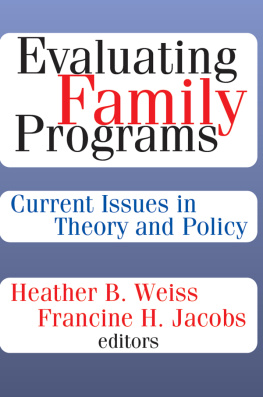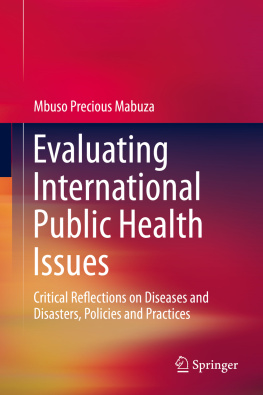Ian Shaw - Evaluating Public Programmes: Contexts and Issues
Here you can read online Ian Shaw - Evaluating Public Programmes: Contexts and Issues full text of the book (entire story) in english for free. Download pdf and epub, get meaning, cover and reviews about this ebook. year: 2017, publisher: Taylor & Francis, genre: Romance novel. Description of the work, (preface) as well as reviews are available. Best literature library LitArk.com created for fans of good reading and offers a wide selection of genres:
Romance novel
Science fiction
Adventure
Detective
Science
History
Home and family
Prose
Art
Politics
Computer
Non-fiction
Religion
Business
Children
Humor
Choose a favorite category and find really read worthwhile books. Enjoy immersion in the world of imagination, feel the emotions of the characters or learn something new for yourself, make an fascinating discovery.

- Book:Evaluating Public Programmes: Contexts and Issues
- Author:
- Publisher:Taylor & Francis
- Genre:
- Year:2017
- Rating:4 / 5
- Favourites:Add to favourites
- Your mark:
- 80
- 1
- 2
- 3
- 4
- 5
Evaluating Public Programmes: Contexts and Issues: summary, description and annotation
We offer to read an annotation, description, summary or preface (depends on what the author of the book "Evaluating Public Programmes: Contexts and Issues" wrote himself). If you haven't found the necessary information about the book — write in the comments, we will try to find it.
Ian Shaw: author's other books
Who wrote Evaluating Public Programmes: Contexts and Issues? Find out the surname, the name of the author of the book and a list of all author's works by series.
Evaluating Public Programmes: Contexts and Issues — read online for free the complete book (whole text) full work
Below is the text of the book, divided by pages. System saving the place of the last page read, allows you to conveniently read the book "Evaluating Public Programmes: Contexts and Issues" online for free, without having to search again every time where you left off. Put a bookmark, and you can go to the page where you finished reading at any time.
Font size:
Interval:
Bookmark:

School of Sociology & Social Policy University of Nottingham

2 Park Square, Milton Park, Abingdon, Oxon OX14 4RN
711 Third Avenue, New York, NY 10017, USA
Product or corporate names may be trademarks or registered trademarks, and are used only for identification and explanation without intent to infringe.
The publisher has gone to great lengths to ensure the quality of this reprint but points out that some imperfections in the original copies may be apparent.
The publisher has made every effort to trace copyright holders and welcomes correspondence from those they have been unable to contact.
- The important thing about monitoring and evaluation is that everyone agrees what we mean by the terms we will use in any given evaluation and then we proceed from there.
- The emphasis is on learning.
- Monitoring is - are we doing what we said we were going to do?
- Evaluation is 'so what'.
- Monitoring looks at inputs and outputs.
- Evaluation looks at effects and impacts although there are often overlaps in effects.
- The following characteristics are evident: MONITORING
- keeps track of activities, expenditures, process
- accepts the policies, rules and conditions which are in place
- focuses on inputs and outputs
- (racks implementation
- concerned with short term accomplishment
- tries to find out why things are or are not working
EVALUATION- looks at consequences
- measures objectives
- questions objectives, policies and procedures in terms of results
- looks for causes, challenges and unplanned change
- challenges assumptions
- seeks lessons learned
Font size:
Interval:
Bookmark:
Similar books «Evaluating Public Programmes: Contexts and Issues»
Look at similar books to Evaluating Public Programmes: Contexts and Issues. We have selected literature similar in name and meaning in the hope of providing readers with more options to find new, interesting, not yet read works.
Discussion, reviews of the book Evaluating Public Programmes: Contexts and Issues and just readers' own opinions. Leave your comments, write what you think about the work, its meaning or the main characters. Specify what exactly you liked and what you didn't like, and why you think so.









